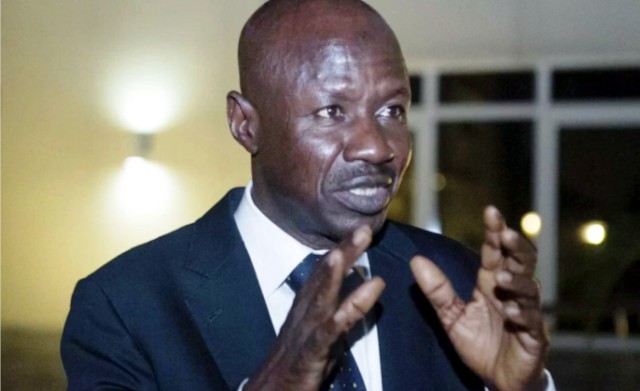Editorial
On Magu’s Rejection

The rejection of Mr Ibrahim Magu as the substantive chairman of the Economic and Financial Crimes Commission (EFCC) by the Senate for the second time after his re-nomination by President Muhammadu Buhari will surely dominate national discourse for a long time to come.
The non-confirmation of Magu’s candidacy by the red Chamber, citing security report by the Department of State Services (DSS) against the EFCC boss has, indeed, thrown up quite a number of issues regarding the relationship between the Presidency, the DSS and the nation’s parliament.
The intriguing aspect of the whole furore is that while the Senate and the DSS appear to be angelic over the matter, Nigerians are pondering over the President’s insistence on Magu’s candidature. The fact that the DSS has indicted him and declared him unsuitable for the EFCC job is enough for the President to withdraw his nomination.
The Tide thinks that the Senate’s rejection of Magu for the second time should send a signal to the Presidency that it should look elsewhere for Magu’s replacement.
We agree that the Presidency may have been pained by Magu’s rejection by the Senate, especially having reposed so much confidence in him to take the anti-graft campaign to a logical conclusion, but the resolution of the 109 Senators representing the entire populace cannot be thrown to the wind.
We believe that there are thousands of other credible Nigerians out there who, if given the opportunity, can take the anti-corruption battle to a higher level.
Our position is further reinforced by the fact that the Presidency and the National Assembly, and indeed, all stakeholders in the Nigerian project must work together, especially at this period of recession to bail the country’s economy out of the woods.
There can be no better time to synergise towards achieving economic emancipation than now, hence, Magu’s case should not be allowed to cause another rift between the executive and legislative arms of government.
It will be paradoxical to allow Magu to remain as the chairman of the anti-graft agency, even in acting capacity, after failing DSS and Senate’s integrity test twice. Except perhaps the DSS makes a U-turn and gives Magu a clean bill of health, the morality question will continue to haunt him as long as he remains and functions in that capacity.
We expect that for a person to be recommended and nominated for such a sensitive position as EFCC’s boss, such personality must be above board, and must have passed through serious screening.
Our advice, therefore, is that the government must henceforth, be circumspect and thorough in its search and screening of persons for all sensitive positions.
If truly President Buhari believes in clearing the Augean stables of corruption in the country, he should first of all, sack Magu over DSS indictment of him. However, if the President is still in doubt of the DSS reports on Magu, he could institute a further probe of the reports ascertain the veracity or otherwise of the DSS allegations.
Editorial
Resolve Rumuwoji Market Issues, Others

Editorial
As NDG Ends Season 2

Editorial
Beginning A New Dawn At RSNC

-

 News4 days ago
News4 days agoAmend Constitution To Accommodate State Police, Tinubu Tells Senators
-

 Politics4 days ago
Politics4 days agoSenate Urges Tinubu To Sack CAC Boss
-
Business4 days ago
Crisis Response: EU-project Delivers New Vet. Clinic To Katsina Govt.
-
Business4 days ago
President Tinubu Approves Extension Ban On Raw Shea Nut Export
-

 News4 days ago
News4 days agoDisu Takes Over As New IGP …Declares Total War On Corruption, Impunity
-
Business4 days ago
Fidelity Bank To Empower Women With Sustainable Entrepreneurship Skills, HAP2.0
-
Business4 days ago
President Tinubu Extends Raw Shea Nuts Export Ban To 2027
-
Sports4 days ago
NDG: Rivers Coach Appeal To NDDC In Talent Discovery

